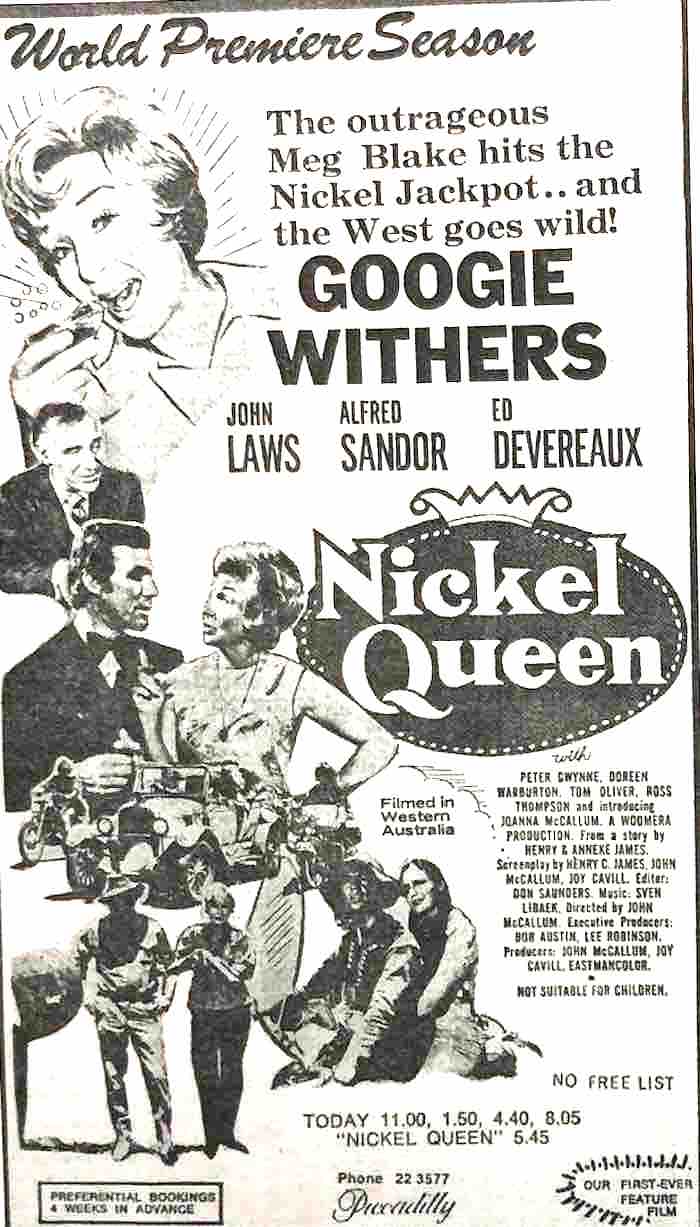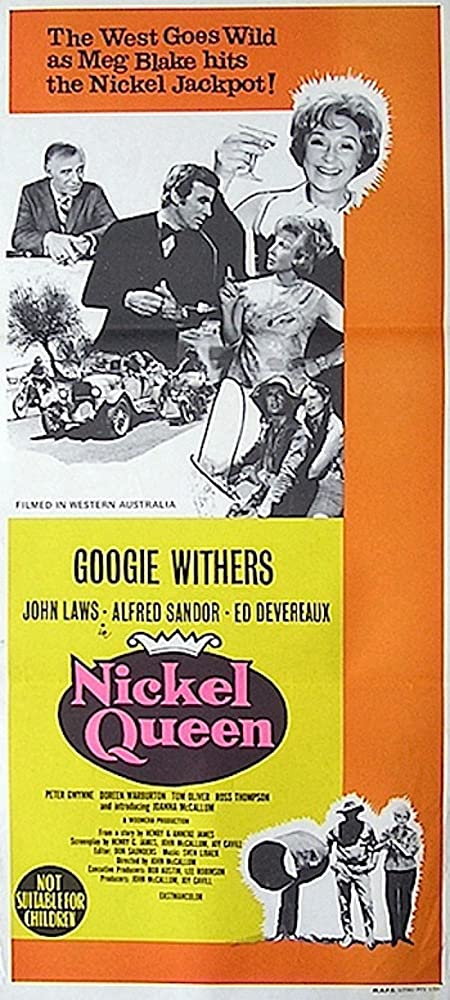'Here today and gone tomorrow'—so ran the refrain of the Nickel Queen's title song. Despite panning from the critics—'an inept comedy', wrote one—the Nickel Queen had a record-breaking run of six months in Perth. Made in Western Australia in 1971, the film's storyline captured the mood of the nickel boom. A ghost town pub owner (played by Googie Withers) pegs a lease over a likely site in the heart of nickel country, makes a fortune in a stock market scam engineered by an American entrepreneur (Alfred Sandor), and comes to the city with ex-hippie gigolo (John Laws) to spend it. Corny—yes. But art mirrored reality, and Perth people flocked to see it.
The premiere on 26 March 1971 was followed by front-page newspaper coverage with the headline 'Glittering World Premiere for the Nickel Queen' and a half-page photograph of guests arriving at Perth's Piccadilly Theatre in Hay Sreet: 'All the excitement and glamour of a Hollywood premiere ... with spotlight and cameras ... play[ing] on cars bringing VIP guests to the theatre'. Film Weekly wrote:
"The pressing throng of onlookers applauded as the high fashion guests walked through a guard of honour of Peters [ice cream] marching girls and the Kinlock Stars. Perth's social set turned up in their elegant gowns and trousers outfits, velvet knickerbockers and glittering maxis ... The men also dressed for the occasion with coloured shirts and ruffles ... The Western Command Band was positioned opposite the theatre and their playing added to this festival occasion."
 Channel 7 provided a direct forty-minute telecast of the arrivals, and celebrities were interviewed by television personalities Syd Donovan and John Hudson. Stephanie Quinlan, host of a popular daytime program, gave a running commentary on the 'gowns worn by the guests'. Among the nine hundred invited guests were the Governor Major-General Sir Douglas Kendrew, the Premier John Tonkin, the Leader of the Opposition Sir David Brand, former Minister for Industrial Development Charles Court, and former Minister for Mines Arthur Griffith. Brand, Court and Griffith, who had just been ousted from government, had all appeared in the film playing themselves—and looking mightily pleased with themselves—in a scene on top of the new Parmelia Hotel (Perth's first international hotel opened in late 1968). Interestingly, the view of the river from the rooftop showed the new freeway in action but surrounded by acres of sand. The view had changed little when the 'magnificent Parmelia Hotel' hosted a champagne supper for two hundred guests after the premiere.
Channel 7 provided a direct forty-minute telecast of the arrivals, and celebrities were interviewed by television personalities Syd Donovan and John Hudson. Stephanie Quinlan, host of a popular daytime program, gave a running commentary on the 'gowns worn by the guests'. Among the nine hundred invited guests were the Governor Major-General Sir Douglas Kendrew, the Premier John Tonkin, the Leader of the Opposition Sir David Brand, former Minister for Industrial Development Charles Court, and former Minister for Mines Arthur Griffith. Brand, Court and Griffith, who had just been ousted from government, had all appeared in the film playing themselves—and looking mightily pleased with themselves—in a scene on top of the new Parmelia Hotel (Perth's first international hotel opened in late 1968). Interestingly, the view of the river from the rooftop showed the new freeway in action but surrounded by acres of sand. The view had changed little when the 'magnificent Parmelia Hotel' hosted a champagne supper for two hundred guests after the premiere.The film's success in Perth had much to do with its production and promotion. While local curiosity partly accounted for huge attendances over the next few months, the televised opening, and the prime-time television screening of a film about the making of the Nickel Queen, played a major part in arousing public interest. And of course, with so many Western Australians appearing as extras, all their relatives and friends queued up for a glimpse. Indeed one scene around a Peppermint Grove pool, featuring a number of well known Perth identities, suggests that there was a certain social cachet in appearing on the set of the Nickel Queen. Producer John McCallum, president of the Australian Film Council, managing director of J.C. Williamson and co-founder of the production house responsible for Skippy: the Bush Kangaroo, certainly had the credentials to impress Perth's establishment as well as business and government.
Money from Perth business was reputed to have provided most of the financial backing for the film, but the State Government also provided considerable assistance. The documentary of the making of Nickel Queen noted that 'complete cooperation had answered many a production problem and eased more than a few budget worries'. The appearance of a premier and two ministers set the seal of approval on the film. A scene showing students invading the stock exchange was filmed on location on a non-trading day, and the police officers who carted the students off in a paddy wagon were on loan from the WA police force. The film premiered too late to help the Brand Government though, which, after a record twelve-year term, was narrowly defeated by the Tonkin Labor team. The local film community, who received little assistance from government or business, were understandably bitter about the ease with which an eastern states company had gained support:
"It is interesting to see that [Nickel Queen] is to get its premiere just before the election ... Its super-colossal, block-busting, gigantic WA release should burst with glory upon the Premier and Court. It will be the first election at which 18 year-olds can vote ... If the Premier and Court are trying to appeal to an emotional vote among these people they may find that today's 18 year-olds are more mature than the callow unsophisticated youth of their own early 'teens."
Many saw the film as a giant tourism boost for Western Australia. As columnist Kirwan Ward wrote, 'visually the whole film is a fine plug for WA'. It was certainly a fine plug for many Perth businesses—including the Parmelia Hotel, Boans, Walshes and Winterbottoms. How the deals were arranged is not known, but it seems likely that each of these businesses got a free plug in return for the supply of a location, clothes and cars for the film.

